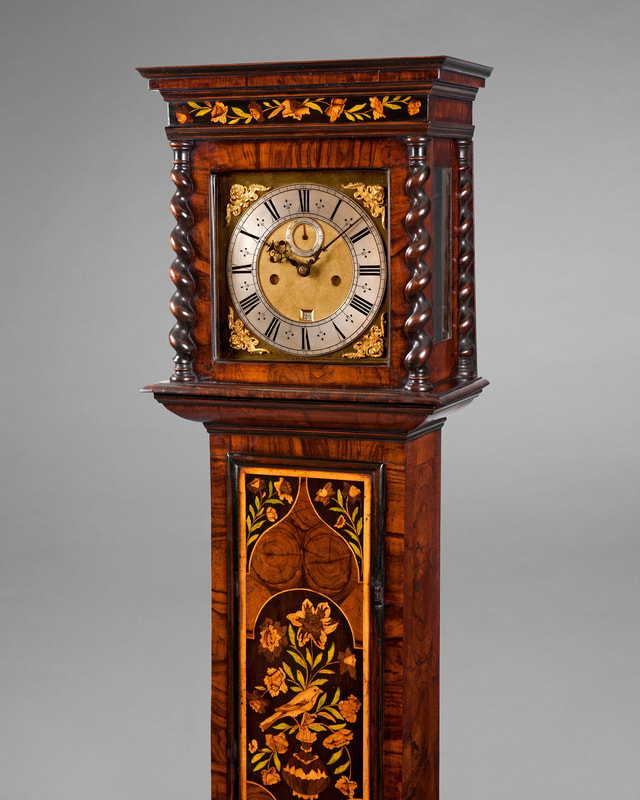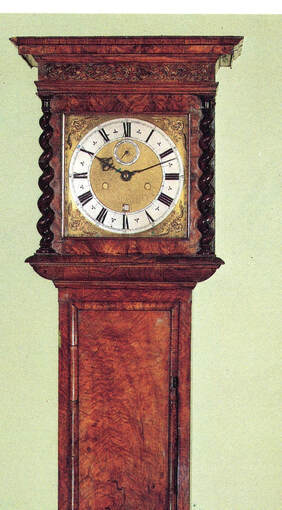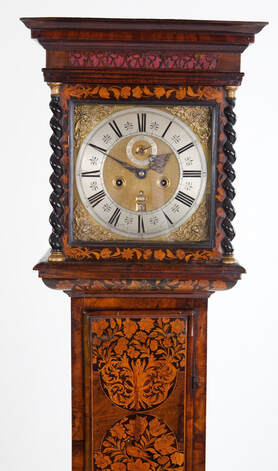|
After the Great Fire of London in 1666 the Clockmakers’ Company (C.C.) were enrolling new members, 28 of whom were described as “great clockmakers” between 1669-1690; others were just enrolled as free brothers. In 1636 the C.C. had signed an agreement with the B.C. saying that they would not enrol any “great clockmakers of iron clocks”, now called turret clocks. Joseph Knibb had worked in Oxford up to 1670, when he moved to London in 1670 he joined the C.C. as a brother but he was not described as a great clockmaker, yet we know that he did make turret clocks while working in Oxford. When Joseph announced his intended retirement to the country in 1697 he described the clocks he was selling off as a “great [large] collection of clocks”. Great was used to describe anything which was big or large in the 17th century. Those clockmakers described as “great” clockmakers by the C.C. included Thomas Tompion (1671), Daniel Quare (1671), Joseph Windmills (1671), James Clowes (1671), John Clowes (1673), Nathaniel Hodges (1681), Christopher Gould (1682), John Williamson (1682) and Joseph Williamson (1686) who had been trained in Ireland. There were other “great” clockmakers whom we know were freemen of the B.C. including Thomas Grimes (1671) who was enrolled by the C.C. on the same day as Thomas Tompion; James Gibson (1669), William Clement (1677) who had been freed in 1664, William Dobson (1670), and John Hardinge (1685).
Thomas Grimes who joined the C.C. on the same day and described the same as Thomas Tompion, as a “great” clockmaker, was freed by the B.C. in 1668 and joined the C.C. on 4th Sept. 1671 along with Tompion. One of Thomas Grimes outstanding 8-day clocks (fig.1) in a beautiful marquetry case, has a 10 in. square brass dial c.1680, has winged cherub spandrels, narrow minute band, seconds ring and square date aperture, in the matted dial centre and is signed on the bottom edge of the dial. The movement has anchor escapement, locking-plate striking and bolt and shutter maintaining power.
Fig.3 illustrates a beautiful 8-day longcase clock with 11in square brass dial in an outstanding marquetry case made by William Grimes c.1690.
Thomas Tompion had close contact with members of the B.C., he had an apprentice, Benjamin Harris turned over to him from John Dyde, a freeman of the B.C., in 1677 and Harris was freed in the B.C. in 1679. Harris may have continued to work for Tompion and he bound an apprentice, Joseph Audley in the B.C. in 1680 who was turned over to Tompion in 1683. Thomas Tompion also played a prominent role in the C.C. in the 1690s because he used a number of out workers in other companies to make his clocks and watches for his workshop and was known to their apprentices, so was able to bring new members into the C.C. At one of their Court meetings on 16th Jan 1698/9 we read that “ Mr. Tompion declared that several persons out of their time bound to other companies were willing to be made free of This Company, if it can be done.”
In my next blog we will look at other important “great clockmakers” one of whom had an even greater impact on British clockmaking than Thomas Tompion's. If you are interested in early clockmakers and watchmakers who made antique clocks and antique watches, you might like to read my book, Early clock and watchmakers of the Blacksmiths' Company.
2 Comments
|
AuthorKeith Bates is an amateur horologist who has been researching clocks, watches and chronometers and their makers for over 30 years. Archives
August 2023
Categories
All
|




 RSS Feed
RSS Feed